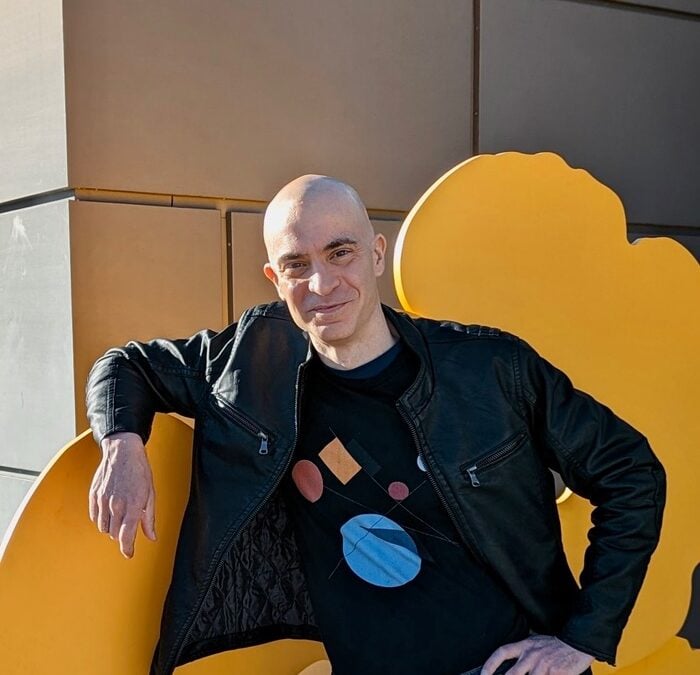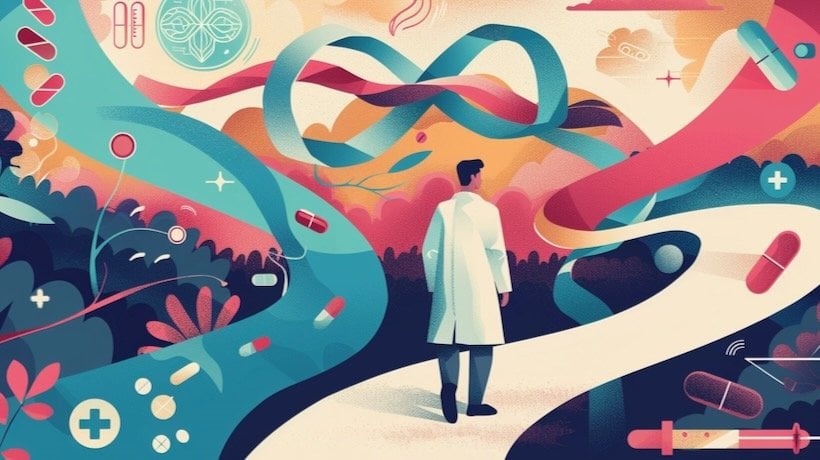Andrew Steele has emerged as one of the leading journalistic voices on longevity, on the strength of his book Ageless: The New Science of Getting Older Without Getting Old. After receiving a PhD in condensed matter physics at Oxford University, Steele became fascinated with aging and interventions to slow the process. He went on to become a computational biologist and used machine learning to analyze genomic data at the Francis Crick Institute in London. In 2020, he published Ageless and was catapulted into the international discussion on longevity.
Steele strives for balance on the broad continuum of longevity science—which ranges from cleaning up our diets to reprogramming our cells’ epigenetics. He emphasizes the more modest end of this continuum but is also fascinated by the far end. Steele is cautiously enthusiastic, for instance, about repurposing drugs such as diabetes medication metformin as antiaging treatments or developing new meds that help clear aged “senescent” cells out of our bodies.


Even sci-fi concepts—such as the prospects for extending life indefinitely through continual development of antiaging technologies—deserve to be taken seriously, in his view. But he strikes cautionary notes about the more speculative technologies—for instance, warning strongly against getting unregulated and untested stem cell treatments abroad.
I spoke with Steele at the outset of researching Worth’s recent feature, “The Wild Science of Growing Younger.” Our conversation provided excellent guidance for the research that followed.
It also provided a lot more information than I could squeeze into an article packed with antiaging experts. Here, I share a bit more of our talk in this Q&A session, which has been edited for length and clarity
What is the goal of slowing, stopping, or reversing aging? Are we looking to live forever? Are we looking to live to 300? Or are you agnostic on this?
I’m actually quite agnostic on how long I live…So a lot of journalists rightly asked me about lifespan, they asked about immortality, they ask, “You give me a year, what year are we going to die?”
Actually, what I really care about is how long you spend in good health. I care about the fact that aging is the single biggest risk factor for almost all of the biggest killers in the modern world—things like cancer and heart disease and stroke and dementia. These are all diseases that are essentially caused by the aging process, if you dig into the biology. And so what I want to do is defer those diseases until as late in life as possible.
What would be sort of a hierarchy of what you can do, probably from not eating sugar to getting stem cells injected?
The single most important things and things that have by far the best evidence at the moment are the things that most of us know we should already be doing. And that’s things like eating well, trying to get a nice, varied diet. Eating more vegetables is probably something most of us could do with—more vegetable protein, particularly—trying to get more exercise. And that’s not just the cardio stuff, but strength training as well to maintain our muscle mass into older age.

The evidence is less strong on sleep, because we can’t do randomized trials. But what we do know is that when you’re asleep, your brain essentially uses that time to clear out some of the accumulated toxic proteins that build up in all of our brains as we age. And so that time is just really, really important to keep your cognitive health, but also the health of the rest of your body going as you get older…
These things aren’t just affecting the systems that you might imagine are directly affected. They’re essentially slowing down the aging process…We know that people who do more exercise are at low risk of dementia, they’re at low risk of certain kinds of cancer.
What about more-speculative tech such as stem cells?
I think there is not a single stem cell treatment for aging that I think is ready for primetime. There are a handful where they’re used in very specific cases. In fact, we’ve been doing stem cell transplants for an incredibly long time, in the case of people who have leukemia…And we have got clinical trials that are going on at the moment for things that are more age related in their nature. So for example, there are clinical trials going on to use stem cells in Parkinson’s disease…
But none are ready for actually people going out and doing them yet…And a lot of the stuff that’s been done mostly isn’t [in] regulated places like the U.S. or Europe, or the UK. They’re available in offshore clinics in places like Costa Rica and Colombia…
So I think that really, what we need to do is invest in the science and get to the point where these things are being handed out by much more conventional hospitals, clinics…when they’ve been approved by the various regulators…
And so I think it’s going to be within the next 10-20 years, these things start to appear—in plenty of time for most people who are alive today.
What would you say would be some of the other technologies out there and your thoughts on them?
I think one of the front runners is going to be repurposed existing drugs. [Organ-transplant drug] rapamycin is one that comes up quite a lot. There’s metformin as well, which is a diabetes drug…We understand a little bit about how they work in people. And they’ve got some hints that they might slow down the aging process…
Perhaps the next in line will be something like senolytic treatments…As you get older, your body accumulates these things called senescence cells…
So if you’ve got a cell, it’s divided too many times and looks like it might be becoming a tumor, your body slams on the brakes…The first issue is that they’re not doing their job, because the reason that they divide is that they can replenish your tissues…They’re also emitting this toxic cocktail of molecules that seems to accelerate much, perhaps even all, of the aging process…
We’ve got drugs called senolytics. These are drugs that kill those senescence cells that we can give to mice, where the experiments have been done so far, when you can effectively make those mice biologically younger.
And then looking a bit further into the future. There are things like gene therapies and stem cell therapies…The FDA approved its first CRISPR-related gene therapy…targeting sickle cell anemia…But again, as we get better at delivering it, and understanding the safety, the side effect profile in these patients who’ve got a very serious disease, we could think about giving these kinds of therapies for longevity….
Do you see all this really as something that would make people younger or essentially just allow them to grow older?
I think there’s an extent to which this isn’t a sensible question…I don’t think we know that there’s a difference between slowing down aging and reversing it, apart from a difference of degree. So it’s like if you were to find a drug that slows down some aspect of the aging process, maybe if you gave more of it, or you find a more-effective drug that does the same thing, but a bit better, maybe that would be classed as an age reversal.
There certainly seems to be evidence in certain situations that that’s possible…This happens in the natural world. So there is this jellyfish called “the “immortal jellyfish,” which can grow up from the polyp stage…into an adult jellyfish. And then if life gets a bit too much, if it’s accumulated a bit too much stress and damage to its biology throughout its life, it can then reverse its biological clock and turn back into a polyp again. And as far as we know, it can do that as many times as it likes…
If you put these four genes [called Yamanaka factors] into a cell, you can turn back the clock and turn it back into a stem cell, a pluripotent stem cell of the sort that originally is able to differentiate into any cell in the body…
But I think what we’ve really learned about those in the last 10 years, is that not only does it turn back the clock in terms of the development cycle, it also seems to turn back the aging clock. If you try and measure the age of the cells in various ways, they seem to get biologically younger again. And so that’s a really cool result. Because if we can reverse the age of individual cells, could we do it for whole animals?
I had a conversation with someone recently about reaching escape velocity—extend your life 30 more years, and in 30 years, we’ll be able to upload our minds. But a lot of what I’m hearing is really about treatment for diseases of aging. And is that really more where the story is?
I think the most important and exciting idea is that we can make people live healthier for longer. And I think when you start talking about, you know, brain uploading and stuff, that can really turn people off…I think the idea of escape velocity is more interesting than the slightly sci-fi name can sometimes make it sound, and less sci-fi. Because if you think about the history of medicine, this is a concept that isn’t entirely alien, right? So the idea is that if you live longer, because of the first round of anti-aging treatments, you could then give scientists more time to develop the next round of anti-aging treatments and live even longer.
Are there significant differences in terms of the regulatory regime or the appetite for these technologies and these methods in Europe?
I think there’s not a huge deal of difference…I think they do understand the potential of these drugs. But what they want to see is a hard endpoint. So what I mean by that is something you can actually test in a clinical trial. And so the FDA signed off on the TAME trial [of metformin]. That was developed in conjunction with the FDA so that they could sign off on the real challenge.
…And there’s a lot more talk in policy circles about preventative medicine generally. But…from what I’ve seen, it’s about diet, it’s about lifestyle, it’s about social determinants of health, as these things are broadly called. These things are super important. I am a huge fan of public health. Do not get me wrong. But I really feel like a lot of the discussion is missing the point that another thing government could do is increase funding for aging biology research. And a lot of these problems, as I discussed before, are essentially accelerated aging…
I think we just need to get regulators, we need to get science funding bodies, we need to get politicians, we need to get policymakers to understand that aging biology drugs aren’t some kooky thing for the super-rich that’s gonna make billionaires immortal. They are actually a fundamental tool in our public health. It’s gonna be absolutely vital if we’re going to get through the 21st century in the best economic and health state that we can.







